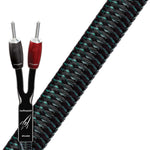Name: The Quest Group BV (AudioQuest / GoldenEar)
Address: Hoge Bergen 10, 4704 RH Roosendaal, Niederlande
Email: info@audioquest.nl
Website: https://eu.audioquest.com/de/
European Manufacturer: Yes

The AudioQuest Rocket 88 stands out through innovative technologies such as the patented Dielectric-Bias System (DBS) and the use of Perfect-Surface Copper+ (PSC+). These features significantly improve the listening experience.
Dielectric-Bias System (DBS): This patented system reduces background noise, allowing you to hear the subtleties of your favorite music even more clearly.
Use of Perfect-Surface Copper+ (PSC+): The additional use of PSC+ ensures softer, more relaxed and more natural tones and structures.
These advanced technologies make the AudioQuestRocket 88 an outstanding cable, specifically designed to give you deep immersion in the music while delivering outstanding sound quality.
Price per pair (left and right)
For other lengths please send us an inquiry.
Do you have questions about a product or would you like an individual offer?
Please feel free to contact us – we are here for you! Our team will advise you personally and create a tailor-made offer that is precisely tailored to your needs.